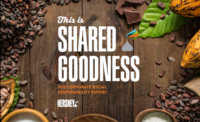Entrepreneurs Unveil New Ventures in Social Responsibility
By Mary Ellen Kuhn
Any fan of premium chocolate can easily observe that Fair Trade Certified chocolate brands are gaining traction at retail, and a growing number of consumers have come to understand the concept of Fair Trade. In fact, nearly four in 10 U.S. adults (39 percent) recognize the Fair Trade Certified logo, according to 2006 research conducted for TransFair USA, the official licensing initiative in the United States for Fair Trade Certified standards.
Now a couple of visionary chocolate makers are
unveiling their own programs designed to introduce even more social
responsibility into the supply chain.
Karlo Flores, founder of Vancouver, British
Columbia-based Terra Nostra Organic Foods, is one of them. Flores describes
the Equitable Trade initiative he helped to develop as “going beyond
Fair Trade.”
Flores is still in the process of finalizing the
business plan and membership procedures, but he envisions Equitable Trade
as a two-tiered effort. On the first level, Terra Nostra — and
ultimately any other participating companies — will pay a premium for
cocoa that has been certified as grown in a socially responsible fashion,
that is, without the use of slave or child labor. A newly designed logo is
available for Equitable Trade program participants.
Flores says his objective in implementing his own
version of a “Fair Trade” program is to ensure complete
transparency and thus to allow him to stay well informed about how funds
are allocated to growers
The second tier of the program involves contributing
funds to charitable ventures in the U.S. and Canadian markets where his
products are sold.
Flores has teamed with Santa Monica, Calif.-based
distributor Essential Living Foods on the venture. Ultimately, Flores
believes, the Equitable Trade initiative will provide a platform for other
vendors seeking an alternative to Fair Trade certifying agency TransFair
USA.
Making a difference
Like Flores, Joe Whinney, founder and president of
Seattle-based Theo Chocolate, is passionate about improving the quality of
life for Third World cocoa growers, many of whom are impoverished.
To that end, he has devised a set of standards or
“Cocoa Practices” that function as tools for evaluating cocoa
producers on their adherence to a variety of environmental, economic and
social responsibility criteria. Ideally, the standards will serve to
encourage growers to continually evolve and improve — vs. the more
cut-and-dried approach of organic or Fair Trade certification.
Whinney’s initiative taps into his many years of
first-hand experience with cocoa growing projects throughout countries in
Latin America and West Africa.
“I understand the supply chain really
well,” he says without false modesty.
The Cocoa Practices standards are “not meant to
replace Fair Trade certification,” Whinney stresses. “The
purpose is to maybe be more comprehensive.”
Whinney is still in the process of tweaking his plan,
but he expects that participating growers will complete an application
outlining their performance as it relates to the standards; adherence will
be assessed by an independent verifier, and the grower given scores based
on how they’re doing relative to the established cocoa practices.
“These standards are meant to be
flexible,” Whinney continues. “The challenges that producers
face in Panama are dramatically different from the challenges they face in
C’ote D’Ivoire.”
The Theo Cocoa Practices project is still in its
infancy, Whinney emphasizes.
The effort is not necessarily something Theo Chocolate
will be focused on communicating to consumers.
“For us, it’s less about a marketing
program and much more about having real integrity in our supply
chain,” Whinney says.





